IBBY project in the spotlight: ‘Read with Me’ in Iran
How can we encourage reading for pleasure in young people and adults? Many organizations have embarked on innovative projects that have contributed to promoting a reading culture. In this international series, we spotlight reading initiatives from around the world that can inspire reading promoters everywhere. This episode: the Read with Me project in Iran.
by guest writer Yasmine Motawy
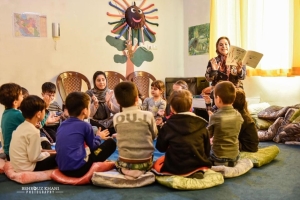
Research in action
The IBBY Flanders team was thrilled when Zohreh Ghaeni was announced as one of the winners of the 2022 IBBY-iRead Outstanding Reading Promoter Award at the 2022 Bologna Children’s Book Fair. IBBY Flanders has previously nominated Ghaeni for the Astrid Lindgren Memorial Award (ALMA) for her outstanding contribution to children’s literature, and we have been firm believers in the value of her work with the Read with Me project since the very beginning.
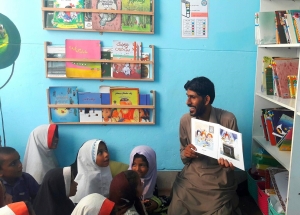
Zohreh Ghaeni, director of The Institute for Research on the History of Children’s Literature (IRHCL) began Read with Me in 2010 with the aim of promoting reading to children in contexts of crisis and deprivation in Iran and some Farsi speaking regions of Afghanistan. The project put the IRHCL’s research into action and produced extraordinary results. Iran has a young population, with over 26 million of 84 million Iranians under the age of 20. Read with Me has to date brought books to the lives of more than 300,000 at-risk children by bringing quality books to children’s libraries in ۲۸ provinces of Iran. It has given countless mothers practical literacy promotion skills that they can use with their families. The project has also trained almost 10,000 teachers, librarians, and volunteers and helped to set up more than 100 libraries.
The more reading promoters I speak to, the more I am convinced: the simpler the project the better it is. Simplicity of design built into the Read with Me project: The project’s underlying principles are expandability, flexibility, and sustainability. These make many aspects of Read with Me easy to adapt and adopt. Eager to learn more, I interviewed Ms Zohreh Ghaeni to understand how these activities functioned on the ground, the challenges the project was faced with, the role of enabling partnerships, and the wider influence of Read with Me.
The initial inspiration for the project came from the IRHCL’s frustration with the cycle of poverty that ensnared thousands of working children in big cities of Iran. In addition to many of them being excluded from schools, they were deprived of the literacy-building and life-enhancing benefits of growing up with books. IRHCL’s research showed that getting quality books into the hands of children not only improved language and literacy skills, but also their comprehension, critical thinking, and creative problem-solving abilities, all soft skills that had the potential to transform their life outcomes.
Meeting challenges
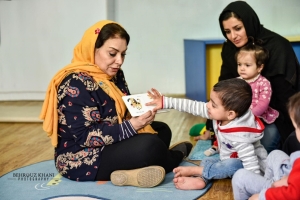
As the project expanded, IRHCL tried to oversee the project in a way that ensured its sustainability. Still, they encountered some challenges, “The unstable political, economic and social conditions create our biggest obstacles. In order to deal with them, we are extremely flexible with our procedures. In the beginning we focused only on the kindergartens and schools in deprived areas. We were supported by the teachers and tutors in training who joined our program in intakes that began every three months, and had access to quality children’s books through class libraries. We would regularly visit the classes with Read with Me trainers, and soon established a system of permanent supervision and evaluation to strengthen the sustainability of the project. We also made sure that the child-centered libraries were established near to schools, and that families – specifically mothers – became involved.”
Other challenges that Ghaeni cites come from the vastness and the diversity of Iran itself, “our country has different climatic conditions, ethnicities, religions, and languages, and its people face different kinds of deprivations, so it is impossible to say that we have been able to find fixed solutions. What does help is having a team that is able to design a specific program for each region, city or village, based on the circumstances of the educators and librarians, the cultural characteristics of the people, and the level of local participation.” The project’s Tehran office has about 10 full-time and part-time project managers, as well as 20 volunteer trainers who travel around Iran training teachers, librarians, and other volunteers. In the provinces, teachers and tutors from the Ministry of Education implement the project in schools and kindergartens. Read with Me tries to find sponsors to pay the trained librarians because they are from the same disadvantaged areas that the children they read to are from.
“The training we offer involves talking to these abandoned children about hope, so that they may feel the warmth of our existence, hear our voice, look into our eyes, and know that we are there, beside them and behind them.”
During the years we have learned how to cope with the big issues. In some areas we have found out that in addition to training the teachers and establishing the school libraries, we should focus on families as well, so we designed some workshops for mothers. Step by step, we worked to convince the parents to acknowledge the benefits of reading with their children. We did this by sending books, handbooks, and video clips. We constantly work to motivate them to build rich literacy environments in their homes. Our experience in emergent literacy helped us to train the nurses in nursery centers to work with orphan babies and toddlers as well. This training involves talking to these abandoned children about hope, so that they may feel the warmth of our existence, hear our voice, look into our eyes, and know that we are there, beside them and behind them.”
Multilevel partnerships
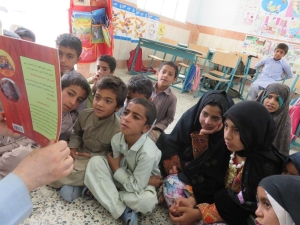
Partnerships are key to the sustainability and success of any reading promotion project, and Read with Me has received support from partners of varying sizes and resources. Private businesses who want to support their activities are usually interested in funding the children’s cultural activities. Since 2019, regular individuals have also been able to donate to the project through the campaign “one teacher, one classroom, one library” which collects small funds to establish small class libraries, “Every individual can adopt a classroom library and support it financially. “Although the campaign collects only small funds, in recent years, it has actually made a meaningful change. The campaign enabled us to train many volunteers around Iran, enabling them to share quality books with children in disadvantaged areas.”
In 2013 and 2019 two Read with Me projects were supported by IBBY Children in Crisis Fund; The first served 800 preschool children in the remote villages of two deprived areas in South Khorasan. And the second went to Khouzestan, a southern region of Iran which suffered from the flooding in spring 2019. After evaluating the capacities of the region, an area called Gouriyeh was selected for assistance. Gouriyeh is a highly populated region that encompasses 56 villages, all of which are in dire need. “Read with Me” was able to establish a child-centered library as a permanent base for reading promotion activities that has become central to the Gouriyeh Library Project. Read with Me has also focused on training and empowering girls and young women from the area to become librarians and local promoters.”
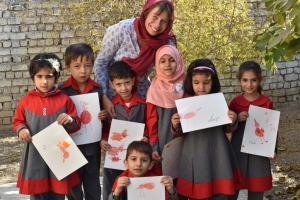
Dutch-Swedish children’s book author and illustrator Marit Törnqvist has also lent her support to the Read with Me project, traveling to Iran twice to give workshops to hundreds of children, teachers, and book mediators. She has also gifted the project the Farsi translation rights to her books and has provided invaluable mentoring to talented young Iranian illustrators who are working on producing quality books for the Iranian market.
Ripple effects of Read with Me
In Ghaeni’s talks at seminal book congregations this year, such as the Bologna Children’s Book Fair, and the 38th IBBY International Congress in Putrajaya, she was keen to share how replicable most elements of the project really were. This replicability is built into the project’s three core principles: being expandable and user friendly, flexible to social and cultural needs and circumstances, and sustainable through robust supervision and constant evaluation.
I ask Ghaeni if the project has been able to influence the way other projects in the region operate or even inspire new reading promotion projects. Ghaeni shares: “The Read with Me community is a small one, and cannot help all children in crisis. But we have developed flexible and sustainable models that can support children without voices and who cannot be seen in various contexts. Read with Me has had a tremendous impact on reading promotion initiatives, children’s libraries, and publishers.
“Reading promotion groups would mostly collect books that were discarded from homes and other centers. After getting to know our work, they changed the way in which they operated.”
Many reading promotion groups would send books to deprived areas without paying much attention to the quality of the books and the ways in which the books would be shared. They would mostly collect books that were discarded from homes and other centers. After getting to know our work, they changed the way in which they operated. Our approach of creating a rich literacy environment at our libraries, and having a child-centered focus has also inspired many changes in the design of Iranian childrens’ libraries. Also, our main motto is “every child has a right to read quality books,” which means that we publish quality books from different countries while respecting copyrights. This has made an impact on some children’s book publishers who had never respected copyright before. Finally, our experts are in the habit of publishing bibliographies of quality books every year, and these lists have become the most important source for selecting quality books for all children’s libraries and schools.”
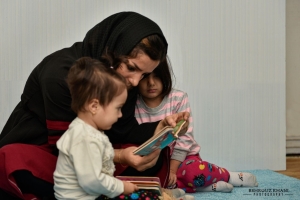
Unexpectedly, the project started an activity stream in response to the requests of many illiterate mothers to hold literacy classes for them. They wanted to learn to read so that they could read books to their children. Our work in this area prompted us to develop a model of ‘maternal functional literacy’ to empower Iranian and Afghan marginalized and illiterate mothers in remote areas, to enable them to support their childrens’ learning and reading.”
Very often Read with Me libraries are the only cultural centers in a village or even a city. As dynamic hubs, they host various cultural events related to the libraries’ book holdings, “it is this dynamism that inspires volunteers to promote the project, to take books to nearby villages, to introduce the library to everyone they know, and to do everything they can to expand the library’s activities.”
“Our experts are in the habit of publishing bibliographies of quality books every year, and these lists have become the most important source for selecting quality books for all children’s libraries and schools.”
Training the trainers
Since expandability is built into the project design, I ask Ghaeni how long the book mediator training took, since this can be a heavy investment that hinders growth. She explained, “Normally, each new member of the Read with Me family attends different workshops in their first year of training. From then on, librarians and teachers receive constant complementary training from Read with Me. Some of the very best trainees in different parts of the country can take on the role of Read with Me ambassadors, training new teachers and librarians themselves. It takes about three years to become a Read with Me ambassador.”
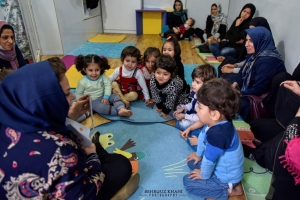
Read with Me supervises activities at a macro and micro level, and requires participating classrooms to have a small library where books are rotated every week. IRHCL’s research and experience indicates that the children who enjoy literature and art in read aloud sessions and performances, become highly motivated to borrow more books from their libraries, even taking them home to share with their parents and siblings, it is therefore important to keep their libraries fresh.
Individual testimonies as well as empirical studies demonstrate that the project and the books it introduces to the lives of the children, have been crucial to improving reading skills and inspiring positive changes in their lives. For example, Azadeh Sadeghi of the Ameneh Nursery reports that the project has enabled the staff at the nursery to use reading to help children of diverse abilities to make the best start in life. When the children are at the library, their book choices are honored and the entire experience is focused on building self esteem. The small children’s stress and anxiety levels drop and they are more vocal about their needs and appreciative of the feelings of others. Sadeghi shares, “book reading to children conveys the message that ‘You are important, we care for you’, self- esteem is a basic human need. During the week when you take children to the library, and you tell them ‘today was your turn’, it means this time is set aside especially for you.”
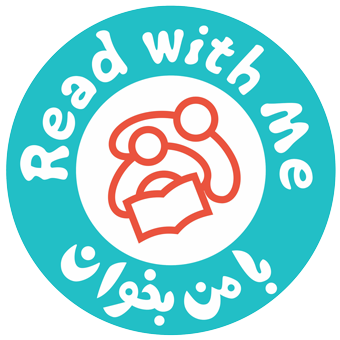
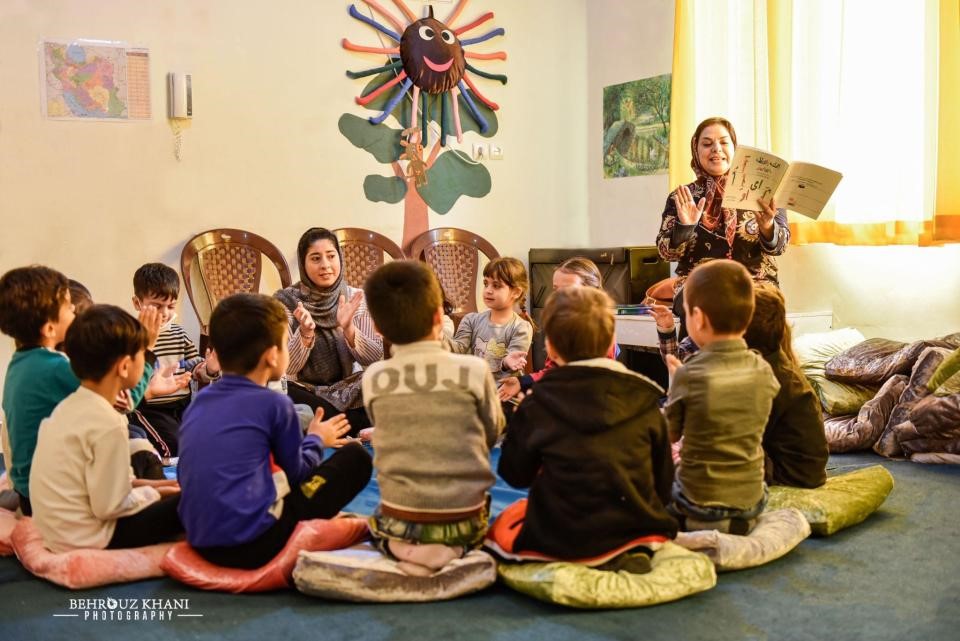


Leave a Reply
Want to join the discussion?Feel free to contribute!